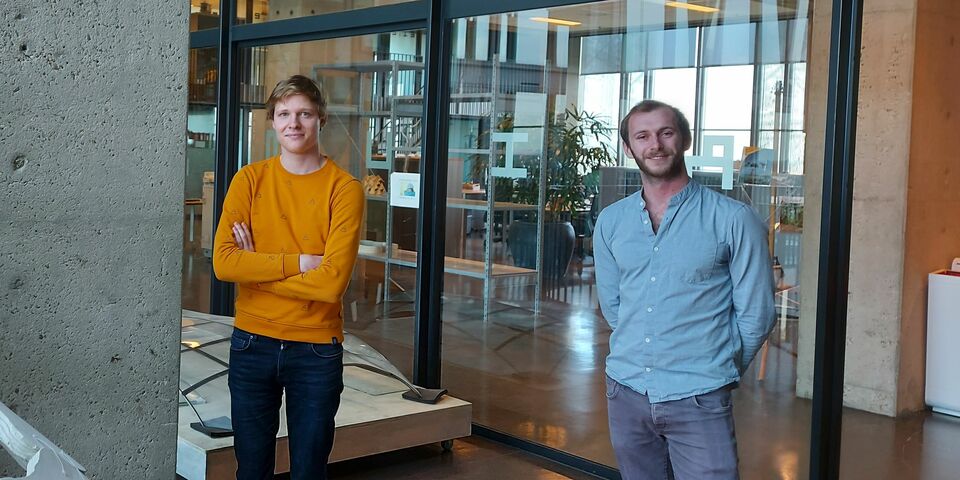Structural Engineering and Design podcast to supplement KOersief
Have you ever thought of making a podcast about the field in which you are making strides as a student? Tom Diks and Pieter van Loon, both students of Structural Engineering and Design did just that, and it was one of the best decisions they ever made. They have enjoyed making every episode of their series with its highly appropriate name ‘Kunnen wij het maken?’ (Can we make it?), which has now been airing on Spotify for a year.
For anyone keen to stay abreast of all the new ideas bubbling up in the construction sector or simply curious about the built environment, the podcast ‘Kunnen wij het maken?’ (Can we make it?) is a hot tip. It is presented by study friends Pieter van Loon and Tom Diks. Both are contributors to the journal KOersief, a source of good articles on structural design topics since 1978.
It is still published twice a year, but Diks was keen to create a modern addition to the paper-based journal. A digital addition at a website seemed harder to create than a podcast about structural design. Diks hunted around to see if such a thing already existed and found nothing. “Then we'll just make it ourselves, won't we?” he decided.
Look behind the scenes
It is not an obvious gap in the market - each episode draws fifty to a hundred listeners - but the podcast does meet the needs of a niche audience. For anyone looking forward to a future as a structural engineer, it is useful and informative. “Although it is also very accessible to the lay person. After all, who isn't keen to know everything about the constructed world around them?” wonders Van Loon. “You are given a great look behind the scenes by people in the field.” An advantage of the spoken world - over the journal - is the chance you get to inject emotion, notes Diks.
And so here we are, a year later with twenty-two episodes on Spotify. Their average runtime is an hour. The recordings are made in the ‘studio’ in Vertigo. This is a room with curtains where, with the exception of six episodes in lockdown, they receive their guests.
Tense
With their first guest they struck gold. “A dream guest, able to speak eloquently, charismatically and sympathetically about the future of the industry. He embraced the idea of a podcast and was less tense than we were, ha-ha. It was our own department dean, Theo Salet. But we had invited him in his capacity as chair of concrete structures.”
The makers usually come up with a theme first, then seek a guest with something to say. Whether the interviewee comes from within or outside TU/e is not an issue, but presenting a balanced array of topics over time is an important consideration. “For instance, we cover a range of materials. Concrete isn't our only topic of discussion. We have also discussed glass, timber and steel and will be doing an episode on biocomposites. And we sometimes interview two people together, say members of team Virtue or two young alumni.”
It is surprisingly easy to create a podcast, discovered Van Loon, “especially compared with a text for the study association magazine.” After twelve episodes they invested in better microphones “and you can hear that”. The price of a business Spotify account is less than fifty euros.
Inclusive
The hosts try to be as inclusive as possible, but it is not easy. “We don't find it easy to find women,” says Diks. It's a similar story for internationals. Here's why the podcast is not in English. “It's something we've given a lot of thought to. We don't want to exclude anyone, but it is so much more relaxed to talk in our mother tongue. And we have hardly any internationals doing our master's. I know of just one,” says Van Loon. However, the students would happily make an exception for an English-language interview.
They are happy with all their guests to date, but if Diks could make one more wish, it would be to have Bart Leclercq on the podcast. “He is a structural engineer expert who studied at TU Delft; he has designed half of Dubai.”
They would like to carry on for years, but it won't be long before they graduate. “We are looking for our successors but that shouldn't be a problem. We can't imagine someone not wanting to do this.”
Anyone keen for tips on starting a podcast at other study associations is welcome to mail them.



Discussion